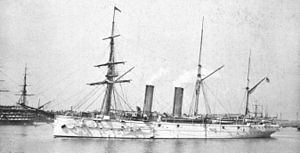Iris-class cruiser

|
|
| Class overview | |
|---|---|
| Name: | Iris class |
| Builders: | Pembroke Dockyard, Wales |
| Operators: |
|
| In commission: | 1877–1914 |
| Completed: | 2 |
| Retired: | 2 |
| General characteristics | |
| Type: | Cruiser |
| Displacement: | 3,730 long tons (3,790 t) full load |
| Length: |
|
| Beam: | 46 ft (14 m) |
| Propulsion: | 2 × Maudslay steam engines, 7,735 hp (5,768 kW) |
| Sail plan: | Barque-rigged |
| Speed: | 18.6 knots (34.4 km/h; 21.4 mph) |
| Armament: |
|
The Iris class comprised two ships, HMS Iris and HMS Mercury, which served with the Royal Navy. They were the Royal Navy's first all steel ships.
They were designed as dispatch vessels by William White under the direction of Nathaniel Barnaby but were later re-created as Second Class Cruisers. They were distinguished by their long, slender hulls which were influenced to an unprecedented degree by their machinery. This combination of fine lines and powerful twin Maudslay engines made them the fastest ships of their day, with Mercury attaining 18.6 knots (34.4 km/h) from her 7,735 horsepower. This class re-established the traditional status of cruisers as being the eyes of the fleet - being faster than the contemporary ships of the line.
Despite being genuine steamers, the ships still sported a light barque sailing rig on completion, although this anachronism was gradually reduced and eventually removed. The ships were not armoured but extensive internal subdivision gave them some protection against flooding.
At 315 feet (96 m) (Mercury) and 321 feet (98 m) (Iris), respectively, and with a beam of 46 feet (14 m) they displaced 3,730 tons fully loaded. The ships carried 780 tons of coal. They were originally armed with ten 64-pounder rifled muzzle-loading (RML) guns and 4 torpedo carriages, but converted in 1888 to fifteen breechloading BL 5 inch guns.
Both ships were built at the Pembroke Dockyard. Iris was launched in 1877 and sold in 1905 while Mercury, launched a year later, was hulked at Chatham in 1914 and sold for scrap in 1919.
...
Wikipedia
